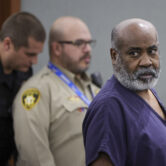WASHINGTON (CN) — A federal judge entered a guilty verdict Tuesday against a New Mexico county commissioner who entered a restricted area during the Capitol riot on Jan. 6, 2021, and remained there for over an hour.
U.S. District Judge McFadden returned the mixed judgment, acquitting Couy Griffin on disorderly conduct charges, after just one day of testimony.
Griffin, 48, is a commissioner in Otero County, New Mexico, and created a political action committee called Cowboys for Trump in the lead-up to the 2020 election.
Prosecutors charged him after the insurrection with two misdemeanor offenses for climbing a stone wall outside the Capitol building and standing under an inaugural stage in a restricted area for more than an hour as part of a mob during the riot. Griffin's is the second conviction in a row for Capitol riot defendants rolling the dice on a trial. Earlier this month, Guy Reffitt, the first Capitol rioter to go to trial, was found guilty by a unanimous jury.
These outcomes are expected to draw additional pleas from fellow Capitol rioters.
In announcing Tuesday's verdict, Judge McFadden said Griffin knew the stage area was restricted because he had seen barriers surrounding it the previous day and that he could not get over the stone wall by himself during the riot.
“He needed help getting up the wall … All of this would suggest to a normal person that perhaps you should not be entering the area,” the Trump-appointed judge said.
Although McFadden found Griffin guilty of entering and remaining in a restricted area, he ruled that the government showed “nothing” to prove its disorderly conduct charges “other than entering the area.”
“And that alone does not fulfill the requirements for a disorderly conduct charge,” McFadden said.
Griffin had joined the mob on Jan. 6 while both chambers of Congress were holding a ceremony at the U.S. Capitol to certify then-President Donald Trump's defeat in the 2020 election. Because of the riot, the ceremony was postponed one day so that authorities could secure the building.
McFadden called it a “serious obstacle” to the government’s argument that Griffin entered the restricted area on Jan. 6 under the assumption that the certification of the election had already occurred.
Assistant U.S. Attorney Janani Iyengar emphasized in closing arguments that Griffin “was standing outside a Capitol building in the middle of what would be a working day.” Even if he did not think he was interrupting the certification, Iyegar argued, it is reasonable to infer he knew he was interfering “with whatever business was taking place in the building at that time.”
This was not enough for McFadden. “But the burden is on the government to show that and there is no such evidence,” the judge said Tuesday.
Iyengar had also noted that Griffin climbed over metal bike racks and yelled at the crowd about the election being stolen.
"He was being extremely loud, climbing over barriers, engaging with the crowd," she said.
The judge meanwhile pointed to testimony from Matthew Struck, who was Griffin’s videographer that day, that Griffin was trying to “calm them down, not rile them up.” Struck received immunity from the government to testify and to provide videos he took on Jan. 6.
Ahead of the riot, Struck and Griffin attended a "Stop the Steal" rally at the Ellipse organized by Trump. The government supplied evidence that the duo later walked over to the Capitol’s Lower West Terrace, stepped over barriers, went up a staircase and joined a mob of people at the stage that was being constructed for the inauguration of President Joe Biden.
In videos of the mob that prosecutors played in court, Griffin can be heard saying , “I love the smell of napalm in the air.” He later said, “this is our house … we should all be armed,” upon making it over the wall into the inaugural stage area.
Griffin’s attorney, Nick Smith, said in closing arguments that the government’s case was “built on a series of false assumptions and premises.”
Smith spent much of the trial on Monday focused on the whereabouts of then-Vice President Mike Pence on Jan. 6, arguing that the area where Griffin was standing could not be considered restricted unless Pence was there too. This argument fell apart, however, when U.S. Secret Service Agent Lanelle Hawa testified for the government witness that Pence remained for hours in an underground loading dock area within the restricted perimeter during the riot.
In closing arguments, Smith highlighted that Griffin did not assault anyone or damage any property during the riot. The judge acknowledged that point while reading his verdict, suggesting that prosecutors did Smith a favor by using video evidence of Capitol rioters fighting with police, throwing things and damaging property.
“Mr. Griffin did none of those things,” the judge said.
Cuoy turned down the judge’s offer to sentence him on Monday and agreed to instead be sentenced at 2 p.m. on June 17. He faces up to one year in prison.
To date, more than 750 people have been charged in connection with the Capitol riot. As of March 10, approximately 195 people have pleaded guilty to misdemeanors, 29 have pleaded guilty to felonies.
Subscribe to Closing Arguments
Sign up for new weekly newsletter Closing Arguments to get the latest about ongoing trials, major litigation and hot cases and rulings in courthouses around the U.S. and the world.









